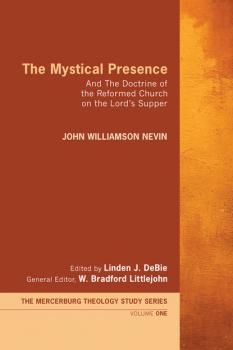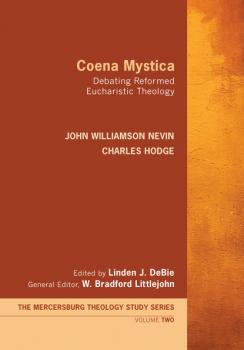Mercersburg Theology Study Series
Скачать книги из серии Mercersburg Theology Study SeriesBorn of Water and the Spirit
Born of Water and the Spirit presents essays on the sacraments by the three major representatives of «Mercersburg Theology,» John Nevin, Philip Schaff, and Emanuel Gerhart. It focuses on Mercersburg's doctrine of baptism and Christian nurture, attempts to correct putative deficiencies of the major Reformed trajectories (e.g., New England and Princeton), and vigorously critiques the anti-sacramental animus of revivalistic evangelicalism. Mercersburg understood baptism as initiating a person (adult or infant) into the sacramental life of the church. Baptism and Eucharist were objective, spiritually real actions that made (what Nevin called) the «mystical presence» of Jesus Christ present to Christians, bringing transformative power into their lives. The present critical edition carefully preserves the original texts, while providing extensive introductions, annotations, and bibliography to orient the modern reader and facilitate further scholarship.
The Mercersburg Theology Study Series is an attempt to make available for the first time, in attractive, readable, and scholarly modern editions, the key writings of the nineteenth-century movement known as the Mercersburg Theology. An ambitious multiyear project, it aims to make an important contribution to the scholarly community and to the broader reading public, who can at last be properly introduced to this unique blend of American and European, Reformed and Catholic theology.
The Incarnate Word
The Incarnate Word contains a selection of the key writings on the doctrines of Christology produced by the theologians of Mercersburg Seminary during the middle of the nineteenth century. Despite the seminary's small stature and marginal position within American religious life, these texts represent some of the most profound wrestlings with the doctrine of the person of Christ that appeared in antebellum America, engaging the latest in German theological scholarship as well as the riches of the Christian tradition. As such, they command more than mere historical interest, providing rich conversation partners for contemporary debates in Reformed Christology, and anticipating the insights of such key twentieth-century theologians as T. F. Torrance. The present critical edition carefully preserves the original texts, while providing extensive introductions, annotations, and bibliography to orient the modern reader and facilitate further scholarship.
The Mercersburg Theology Study Series is an attempt to make available for the first time, in attractive, readable, and scholarly modern editions, the key writings of the nineteenth-century movement known as the Mercersburg Theology. An ambitious multi-year project, this aims to make an important contribution to the scholarly community and to the broader reading public, who can at last be properly introduced to this unique blend of American and European, Reformed and catholic theology.
The Mystical Presence
The Mystical Presence (1846), John Williamson Nevin's magnum opus, was an attempt to combat the sectarianism and subjectivism of nineteenth-century American religion by recovering the robust sacramental and incarnational theology of the Protestant Reformation, enriched with the categories of German idealism. In it, he makes the historical case for the spiritual real presence as the authentic Reformed doctrine of the Eucharist, and explains the theological and philosophical context that render the doctrine intelligible. The 1850 article «The Doctrine of the Reformed Church on the Lord's Supper» represents his response to his arch critic, Charles Hodge of Princeton Seminary, providing what is still considered a definitive historical treatment of Reformed eucharistic theology. Both texts demonstrate Nevin's immense erudition and theological creativity, contributing to our understanding not only of Reformed theology, but also of the unique milieu of nineteenth-century American religion.
The present critical edition carefully preserves the original text, while providing extensive introductions, annotations, and bibliography to orient the modern reader and facilitate further scholarship.
The Mercersburg Theology Study Series is an attempt to make available for the first time–in attractive, readable, and scholarly modern editions–the key writings of the nineteenth-century movement known as the Mercersburg Theology. An ambitious multi-year project, this aims to make an important contribution to the academic community and to the broader reading public, who may at last be properly introduced to this unique blend of American and European, Reformed and Catholic theology.
Coena Mystica
Coena Mystica contains the never-before-reprinted text of John Williamson Nevin's response to Charles Hodge's devastating critiques of his 1846 magnum opus, The Mystical Presence. Initially appearing in twelve issues of the little-known Weekly Messenger of the German Reformed Church and almost entirely neglected by historians since, Nevin's response included the full text of Hodge's article, with his rejoinders interspersed every few pages. These articles, in addition to providing a lively and illuminating debate on the roots of Reformed eucharistic theology, take the disputants into such fields as the nature of the church, the development of doctrine, the person and work of Christ, and the merits of German idealism. The quality of the historical argument and theological acumen here displayed makes this exchange one of the landmark theological controversies of the nineteenth century, a gift to historians of the period, students of Reformed theology, and anyone seeking to better understand the contentious legacy of the Protestant Reformation. The present critical edition carefully preserves the original text, while providing extensive introductions, annotations, and bibliography to orient the modern reader and facilitate further scholarship.
The Mercersburg Theology Study Series is an attempt to make available for the first time, in attractive, readable, and scholarly modern editions, the key writings of the nineteenth-century movement known as the Mercersburg Theology. An ambitious multi-year project, this aims to make an important contribution to the scholarly community and to the broader reading public, who can at last be properly introduced to this unique blend of American and European, Reformed and Catholic theology.
One, Holy, Catholic, and Apostolic, Tome 2
John Nevin's vision of the church as «one, holy, catholic, and apostolic» grew out of his critique of the revivalism and sectarianism that prevailed throughout evangelical Christianity in the nineteenth century. He deepens his perception of catholicity as an expression of Christian wholeness, his response to the parochialism that ruled American religion and life. He grounds congregational life and mission in the Lordship of Jesus Christ, ordered by the whole Christian tradition, which comes into focus in the Apostles' Creed. This edition carefully preserves the original texts while providing extensive introductions, annotations, and bibliography to both orient the reader and to facilitate further scholarship.
The Mercersburg Theology Study Series presents for the first time attractive, readable, scholarly modern editions of the key writings of the nineteenth-century movement known as the Mercersburg Theology. An ambitious multi-year project, it aims to make an important contribution to the academic community and to the broader public, who can at last be properly introduced to this unique blend of American and European Reformed and Catholic theology.
One, Holy, Catholic, and Apostolic, Tome 1
The mid-nineteenth century is a gold mine for contemporary scholars interested in American Protestant ecclesiology. There one will find the extensive writings of John Nevin who came to the notice of the theological world with The Anxious Bench, a critique of the «quackery» of Protestant revivalism. Influenced by a critical appropriation of cutting-edge contemporary German theology, he came to believe that the church was not «invisible,» but the visible manifestation of Jesus Christ's incarnate life. Christians were to pursue unity, not in external institutional arrangements, but as unity of spiritual life. This compilation presents his theology of the catholicity of the church prior to his masterwork, The Mystical Presence, and a multifaceted, sophisticated critique of American sectarianism. This edition carefully preserves the original texts while providing extensive introductions, annotations, and bibliography.
The Mercersburg Theology Study Series presents for the first time attractive, readable, scholarly modern editions of the key writings of the nineteenth-century movement known as the Mercersburg Theology. An ambitious multi-year project, it aims to make an important contribution to the academic community and to the broader public, who can at last be properly introduced to this unique blend of American and European Reformed and Catholic theology.






